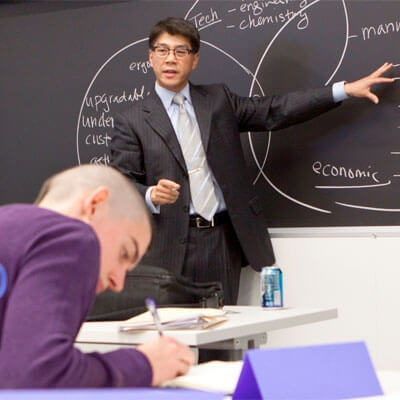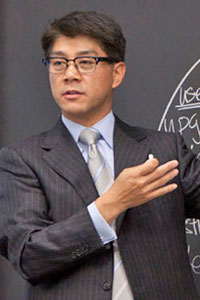News
Woodward Yang is Gordon McKay Professor of Electrical Engineering and Computer Science at SEAS. (Photo by Eliza Grinnell, SEAS Communications.)
The smartphone is dead? Long live the smartphone!
In the fast-moving world of high tech, you’re up one day and down the next. Desktop computers were bumped aside by laptops, and tablets are now returning the favor, grabbing laptop market share.
Basic cellphones gave way to feature phones, which now fill the middle of the market, having ceded the high end to smartphones.
Since the only unchangeable thing in the tech industry is change, some observers are wondering not if smartphones will get knocked off their perch, but when, and looking toward Google Glass and a wave of smartwatches as potential successors.
Business watchers, meanwhile, are worried by the possible disruption of the business model, and an end to the dominance of Apple and Samsung as multiple other players enter the fray.
Woodward Yang, the Gordon McKay Professor of Electrical Engineering and Computer Science and a University Fellow at Harvard Business School, has had his finger on the pulse of the industry since his work developing the CMOS image sensors common in cellphone cameras; more recently, his expertise was sought in Apple’s patent infringement lawsuit against Samsung over technology created for — you guessed it — smartphones. The Gazette asked him about prospects near and far in personal tech.
GAZETTE: The smartphone seems to have comfortably reached the top of the market, but with technology disappearing as fast as it appears today, this can’t last. What do you see happening next?
YANG: The smartphone is now a burgeoning business for big players and the two big players are Apple and Samsung. They’re fighting over it, but what’s happening is that the features and functions have become more commoditized.
It’s classic in what you see with technology. It rises very fast, it becomes more mature, it becomes a commodity, and as it becomes a commodity, more and more people can do it.
But what’s happened is that the technology — [though it’s] quite sophisticated —has become so commoditized, now almost anybody can just buy the parts and put together a reasonable system. So Huawei does this, HTC does this, while Google provides the key Android software. They just have to put the pieces together now. This has even happened in the automobile industry and especially with electric vehicles.
GAZETTE: Do you see a disruption in this technology coming?
YANG: That’s exactly what you see. As the technology matures, you get a disruption. It’s not a disruption of technology, though, but a disruption of the business, the high-margin business.
The high margins that Apple and Samsung get on the smartphones are going to be eaten away by companies like HTC, Huawei, and others to be named. They’re going to introduce smartphones that are almost as good and most people are not going to be able to tell the difference.
So Apple and Samsung, and maybe Motorola-Google, are trying to innovate to make sure your smartphone stays special and doesn’t become a commodity. They’re going to do that by trying to create a web of devices — like a smartwatch, the Google Glasses, the iCloud, and Samsung can connect to your TV.
That’s what they’re trying to do, so you feel like you’re getting extra value for your phone. That’s what people are talking about. It’s a classic thing that happens to tech all the time. This is the motivation behind the relentless innovation in tech and the differentiation that it gives your products so that you can command higher margins and larger market share...
Read the entire interview in the Harvard Gazette
Topics: Electrical Engineering, Computer Science
Cutting-edge science delivered direct to your inbox.
Join the Harvard SEAS mailing list.
Scientist Profiles
Woodward Yang
Gordon McKay Professor of Electrical Engineering and Computer Science




